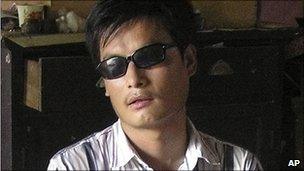-
Published

Blind since a young age and a self-taught legal activist, Chen Guangcheng rose to prominence for helping to expose harsh realities about China’s family planning policies.
His activism landed him in jail between 2006 and 2010 but even after he was released, Mr Chen and his family were placed under virtual house arrest at his home in Shandong province.
But events took a dramatic turn in late April 2012 when Mr Chen escaped from house arrest and sought refuge at the US embassy in Beijing. He stayed there for six days sparking a diplomatic crisis with the US and only left on 2 May for a hospital.
He was offered a fellowship at a US university – as part of what many analysts believe was a deal to get Mr Chen out of the China – and on 19 May he left China for New York.
The activist has long been a cause celebre around the world, not least for his treatment in his home village of Dongshigu at the hands of local security figures, apparently acting outside the law but with the authorities’ approval, analysts believe.
For years US congressmen and diplomats, including Secretary of State Hillary Clinton, all voiced their concern.
But it is really his prior activism which inspired Chinese dissidents and campaigners around the world.
Path to prison
Mr Chen first rose to prominence in June 2005 when he filed a class action lawsuit accusing officials in the city of Linyi in Shandong province of forcing women to late-term abortions, imposing compulsory sterilisation and midnight raids and beatings, according to a Human Rights Watch profile.
His outspoken and passionate campaign earned him a label as China’s “barefoot lawyer”. According to those who spoke to him , he believed that by exposing abuses by local bureaucrats he could persuade high-level officials to put an end to them.
But just months later, in August 2005, officials put Mr Chen and his entire family under house arrest for six months.
A high profile interview with Time magazine about the forced abortion cases is thought to have further angered authorities.
He was formally arrested in June 2006 for disrupting traffic and damaging property. After a brief trial, where he did not have access to his defence lawyers, he was sentenced to four years in prison.
He denied the allegations and many believe the charges were brought simply to silence him.
Correspondents say that in the past 18 months since his release he has repeatedly complained of local security thugs beating him and his wife.
There have also been reports from one Chinese human rights group that he has been unwell.
Scores of journalists and other high-profile figures have attempted to visit him in his home only to be turned away by local security officials.
Late last year the BBC’s Michael Bristow tried to visit him in Dongshigu but was stopped by plainclothes security officers.
When the BBC visited, it was clear the men who stopped them were well drilled and organised – although it was impossible to say who had hired them, says our correspondent.
Another activist who tried to visit Mr Chen told our correspondent that he was severely beaten in an attempt to reach the home in Dongshigu.
Mr Chen’s life under apparent confinement in the village has been widely reported on and documented by various groups. It is just such reports that have fuelled international concern on his behalf.
Self-taught lawyer
Chen Guangcheng was born 12 November 1971 in a rural area of Shandong province. He lost his sight early in life – but there are several accounts about exactly when and how this happened.
Reports of his early life from social media websites and blogs say that he was illiterate until 1994 when he was finally enrolled by the Qingdao High School for the Blind, where he studied for four years.
He is also said to have told friends that he had a happy childhood untroubled by his blindness.
One account says that he began his activism early, reportedly campaigning for the enforcement of a law exempting people with disabilities from various taxes and payments.
He is then reported to have studied at the Nanjing University of Chinese Medicine from 1998 to 2001, when he returned to his home province of Shandong.
But he managed to enrol in law classes and he is said to have learned enough to help his fellow villagers when they sought his help.
But these were just the precursors for his defining campaign on forced abortions, which ultimately contributed to his imprisonment and raised his international profile.

